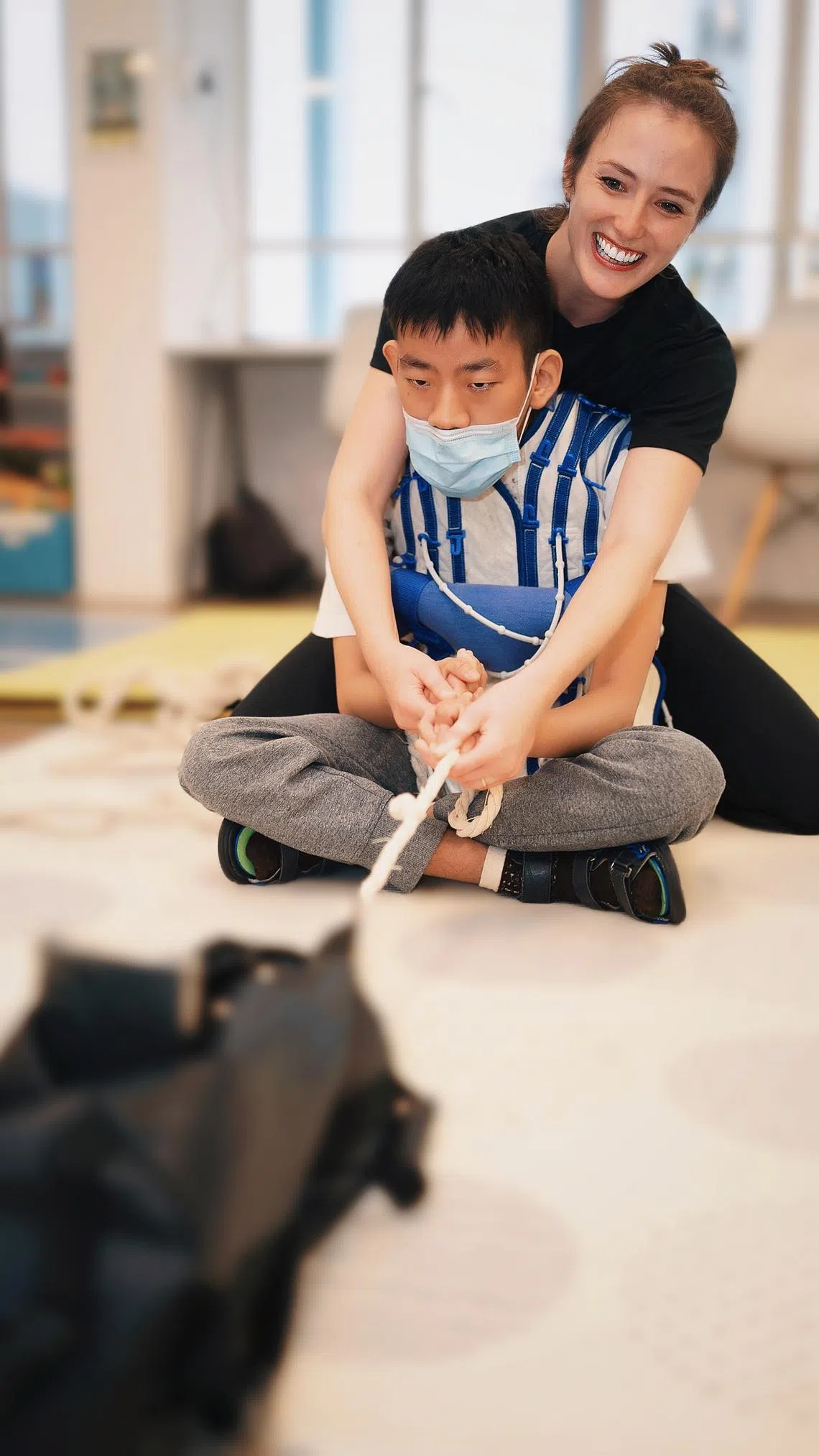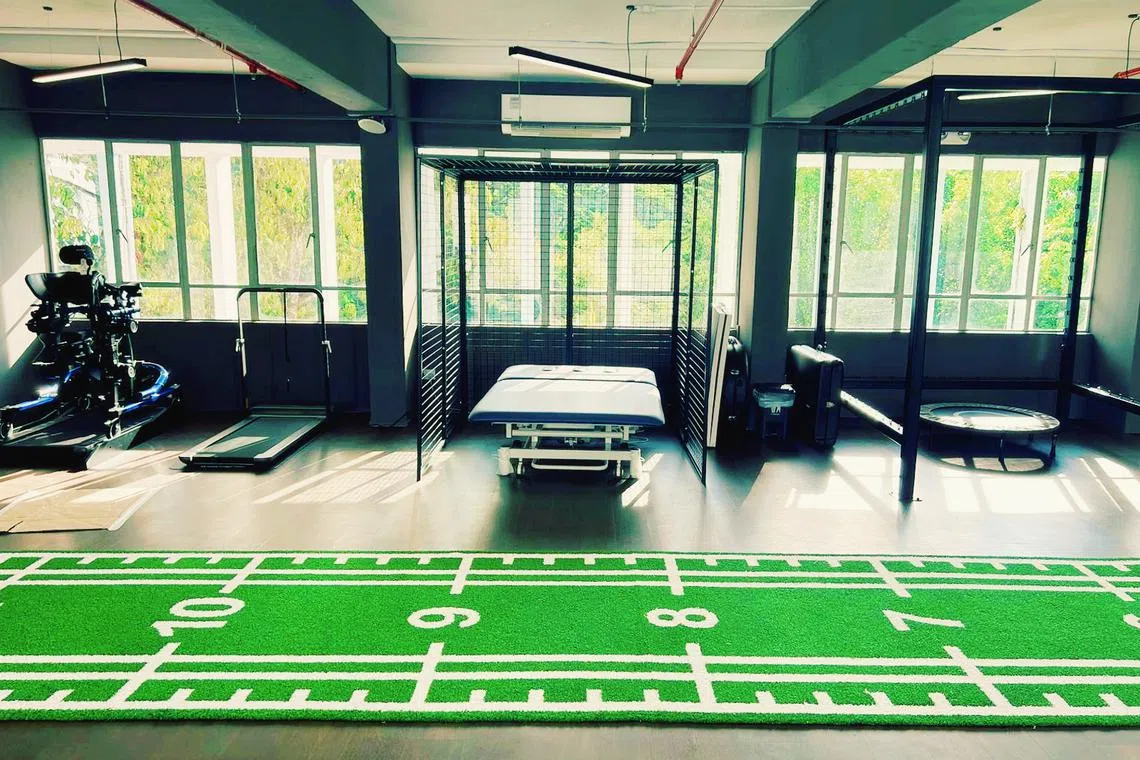Social enterprise Wings looks to expand across South-east Asia
The therapy and learning centre veers from traditional therapy by focusing more on goal-setting and customisation for its clients, including children with special needs
CHILDREN of all ages taking part in functional exercises with their therapists next to them. This is a daily scene at Wings, a therapy centre for children and youth with special needs.
It is also Singapore’s first and only physiotherapy facility that veers from traditional therapy, said its founder and chief executive officer Judith Julia Justin, explaining that the centre focuses more on goal-setting and customised programmes, depending on individual needs and concerns.
Its clients include children with special needs, and its new youth centre, which opened in May 2024, serves those aged 13 to 25.
Wings deviates from the conventional treatment of people with issues such as cerebral palsy through specialised therapies such as “Spider Cage”. In layman’s terms, it is a dynamic bungee system, said Justin.
Using restrictive bands, Spider Cage helps a child in various ways including muscle strengthening and functional activities such as sitting, transitioning to standing, balance and coordination, she added.
Baby Angela (not her real name), who was diagnosed with various health issues that resulted in developmental delays at age one, is seeing some progress thanks to it.
Navigate Asia in
a new global order
Get the insights delivered to your inbox.
Her parents noted that within just a few months of therapy, the toddler – who turns two next year – can now sit independently.
Clientele
Set up in 2017 and becoming a social enterprise mid this year, about 60 per cent of Wings’ clients are local, while the rest flies in from around the world.
The centre hopes to expand its footprint across South-east Asia in the future, with Indonesia as its first target since a “big percentage” of its clients are based there.
The company said: “Many families choose to travel to Wings in Singapore due to the scarcity of truly intensive therapy centres in their home countries.”
Such clients attend boot camps, and therapists teach their caregivers how to carry out the programme so they can continue it at home.

The class fees can go up to S$260 an hour. Therefore, the centre launched the Wings For Good programme in March – an initiative under its Jake Kristian Foundation, which extends help to middle- to lower-income families – to make therapy more accessible for lower-income groups.
Wings – which became a certified social enterprise in June this year – takes into account a family’s income, tax returns and living conditions before deciding on their eligibility for the programme. So far, no one has been turned away.
“Life-changing”
Justin, who spent nearly two decades in marketing and public relations, said that the initiative also stems from her personal experience.
When her son, Jake, was one year old, he was diagnosed with quadriplegic cerebral palsy; he was unable to walk.
Twelve years later, he was diagnosed with NACC1, a rare genetic mutation that causes feeding difficulties, epilepsy and other symptoms.
Noticing a lack of goal-focused intensive therapies for Jake, Justin sought alternative therapies.
“This is a full infrastructure that I studied very intensively for, with my son going for 110 intensives over the last seven to eight years,” she said.
“We have travelled the world. I also got additional certifications, learning about each therapy. I must’ve done every type of therapy under the sun, just to understand which ones really work for our children.”

Justin said Wings measures success by hitting therapy goals.
Citing a 2009 study, the centre noted that children with cerebral palsy who are rated above Level 3 of the globally recognised Gross Motor Function Classification System (GMFCS) “tend to experience a functional decline as they grow older”.
“We have case studies demonstrating a 70 per cent success rate, where children not only maintain but improve their functional abilities, even in cases where functional decline would typically be expected,” it added.
“Several children who entered therapy with GMFCS Level 4 ratings have achieved motor milestones like independent standing, improved gait, or better mobility – goals that might otherwise have been out of reach without intensive intervention.”
Justin noted that the intensive model of therapy, which Wings uses in its practice, changes children’s lives “significantly”.
Besides toddlers such as Angela, adults benefit from the programme, too.
One such client, S, was diagnosed with quadriplegic cerebral palsy. At the age of 20, she could not sit, stand or walk independently.
However, since participating in Wings’ programmes as well as methods including Spider Cage, she has improved her postural strength, among others.
Wings is on the lookout for more partnerships to sponsor special needs children who need therapy.
“We would love some philanthropists or corporates to look at our programmes and sponsor these kids, because any type of physical therapy is the difference between a child living without surgery and pain, or living with it,” said Justin. “It’s life-changing.”
Decoding Asia newsletter: your guide to navigating Asia in a new global order. Sign up here to get Decoding Asia newsletter. Delivered to your inbox. Free.
Copyright SPH Media. All rights reserved.


